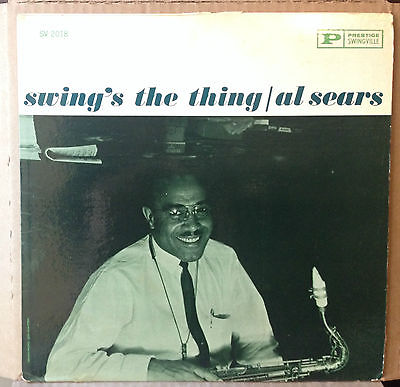Wendell Marshall is the Prestige veteran here, the stalwart of many a Prestige, Moodsville, Bluesfille and Swingville recording session. Drummer Joe Marshall is no relation, and neither of them are related to the earlier Joe "Kaiser" Marshall, also a drummer for virtually everyone from the 1920s
through the 1940s. Or, for that matter, rock drummer John Marshall or British swing drummer Jim Marshall, later to gain fame as the inventor of the Marshall amp. This Joe Marshall kept the name alive starting in the 1940s with Milt Larkin, Jimmie Lunceford and Duke Ellington (the two Joes could almost have overlapped in the Ellington orchestra). In the 1950s, he played on a lot of rhythm and blues recordings, including albums by Ruth Brown and LaVern Baker, and was used on one of the first experiments with doubling up drummers, joining with Bobby Donaldson to provide the punch for a recording by Louisiana swamp rocker Joe Clay. He's on the original cast recording of the Fats Waller Broadway musical, Ain't Misbehavin'.
Guitarist Wally Richardson, born in 1930, came of age in the 1950s, playing jazz (Louis Armstrong), blues ( Willie Dixon -- for Prestige-- and John Lee Hooker), pop (Tony Bennett and Eartha Kitt), rhythm and blues (Frankie Lymon and the Four Tops). and even gospel (Mahalia Jackson). And in 1968, he returned to Prestige to make the recording, Soul Guru, for which he is best remembered.
Soul Guru reflected the fractured and fused music of the late 1960s, but jazz remained his first love. Now retired, he reflected in a recent interview with Pennsylvania's online newspaper The Citizen's Voice:
Jazz will never end. Maybe people won’t listen to it but it will always be there being created in some little club. It may take a curb because it is influenced by different parts of the world — Middle East, Africa, Europe — but it’s wherever Jazz people are. It’s a strong influence but it doesn’t make as much money as rock, but it’ll be there all the time. It’s like the spirit of music, the spirit of ...Don Abney appeared on Sears' Swingville All Stars session, so he's had experience with Sears before. My guess is that all of them were guys who worked regularly in clubs with Sears. They certainly have an easy swinging familiarity.
The album is divided between originals and compositions by others, starting (taking them in the order of presentation on the record) with one by Walter Bishop, "Moving Out." Bishop was originally
Jamaican--his calypso, "Sex is a Misdemeanor (De More You Miss, de Meaner You Get)," continues to be widely performed--who went on to write songs recorded by Count Basie, Louis Jordan and others. His son, Walter Bishop, Jr., became an important pianist in the bebop era. "Moving Out" sounds as though it might be an Eric Dolphy title, but it's a lovely swing ballad that's given a choice introduction by Richardson before Sears takes over with some beautiful, relaxed, thoughtful swing. Abney has a strong solo also.
Three compositions by Sears follow. "Record Hop" is appropriately danceable, with some boppish elements (mostly provided by Abney). It's a four-and-a-half minute cut, and while that can all fit into the grooves of a four-and-a-half-minute 45 RPM disc, I'm guessing Abney's solo was cut for the jukebox release. "Take Off Road" takes off, from lyrical to harder driving swing, but without ever losing that lyrical feel. "Already Alright" has that lyricism too. As a composer, Sears is really only known for "Castle Rock," but these show him to be a worthy melodist.
Don Abney is also represented with one original, "Ain't No Use," which features a lot of piano and guitar, and which I liked a lot."
The others are standards, which Sears and co. handle with aplomb, particularly the Ellington standby, "In a Mellow Tone."
"Record Hop" is probably my favorite from the session, and it was released on 45 along with "Take Off Road." Esmond Edwards produced.
Listening to Prestige Vol. 2, 1955-56, and Vol. 3, 1957-58 now include, in the Kindle editions, links to all the "Listen to One" selections. All three volumes available from Amazon.
And Vol. 4 is very close to completion. Watch for it!
The most interesting book of its kind that I have ever seen. If any of you real jazz lovers want to know about some of the classic records made by some of the legends of jazz, get this book. LOVED IT.
– Terry Gibbs



No comments:
Post a Comment